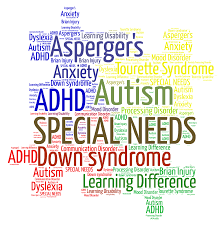The day has finally come. You arrive home from the therapist’s office to whom you and your child were referred to by the school. The diagnosis explains the challenges he has in class and with keeping up. You now have a label. Doctor’s names, medications, treatments, and therapies are spinning in your mind. In a way, this label makes sense; it gives you something with which to work with. In another way you want to shrug it off as over-examining a creative, energetic child. You have a foreboding sense of no return.
Solutions to either overcome the issue or control the symptoms so that they do not impact major life functions become your top priority.
Gather information about the diagnosis. Knowledge is power. The more you understand the situation the better prepared you will be. You’ll ask better questions and identify the best services for your loved one.
Seek support services for your loved one. Make a list of agencies that provide support to individuals and families impacted by the particular diagnosis. Does the support include family members as well as the child? Are there tutors, therapists, and organizers who specialize in this area? Does Supplemental Security Income play a part? Is the child eligible for Medicaid? Primary and/or secondary insurance may be important if there’s a medical component to the issue.
Create an organized structure to maintain information. For instance, I love using the phone app any.do to track tasks, calls, errands, and projects. All lists can be easily shared with anyone you choose, and reminders can be linked with your calendar. Evernote is extremely useful for organizing notes and records. For example, I’ve created a “notebook” for a loved one whom I’m helping to navigate the healthcare system. Within his Evernote “notebook,” individual “notes” have been set up for each doctor to track visits and medications prescribed. Another “note” can be added each time we visit a particular doctor. A parallel filing structure has been created for any paper records that need to be kept for the purposes of benefits and possible questions or disputes.
Self care is as important as advocating for your loved one. This is hard for all caregivers, especially moms. However, the common anecdotes are true. You are no good to anyone if you’re depleted. Even brief periods of relaxation can be restorative. A few minutes of meditation, exercise, coffee, a phone conversation with a friend, or a lunch date can do a world of good. Healthful meals and good sleeping habits must be prioritized when under stress. I’ve heard some say that time away feels like time or money that should go to their child (or loved one). Please consider this, if you’re frazzled and on edge your children will pick up on it and may not understand your stress. Consider hiring a babysitter, taking turns with your spouse or a sibling for a little time off, ask a grandparent, or a trusted friend for help.
Most importantly, remember differences don’t need to be viewed from a glass in half-full position. In fact, the more we know about different disabilities, the more we know about their hidden blessings. Many people with differences have hidden talents (depending on the disability) surpassing the typical personal: creativity, an ability to recognize detail, sheer honesty, an indisputable sense of right and wrong, a great ability to focus for long periods of time, very high IQs, exceptional memory, unconditional love, dedication … I could go on and on. Back when I was in school, there was a focus on improving student deficits. Now, finally, thinking has come around to concentrating on and developing student talents. I hope it’s a bright age for those with differences and that we can learn from each other.
Meanwhile, gather information, seek support services, stay organized, and don’t forget to take care of yourself. I’m cheering for you!





